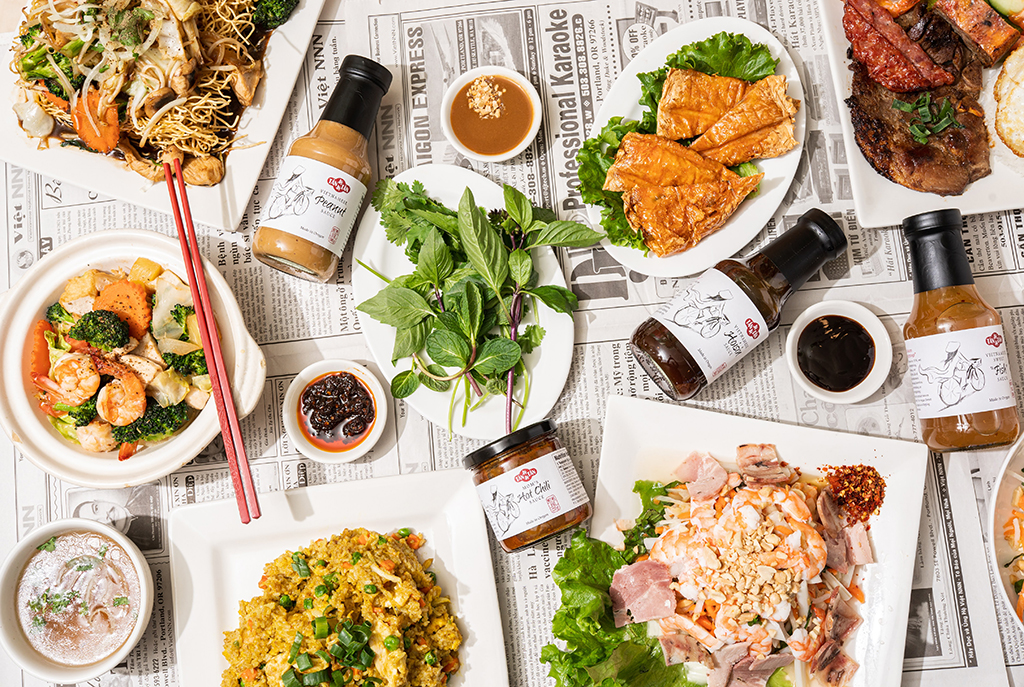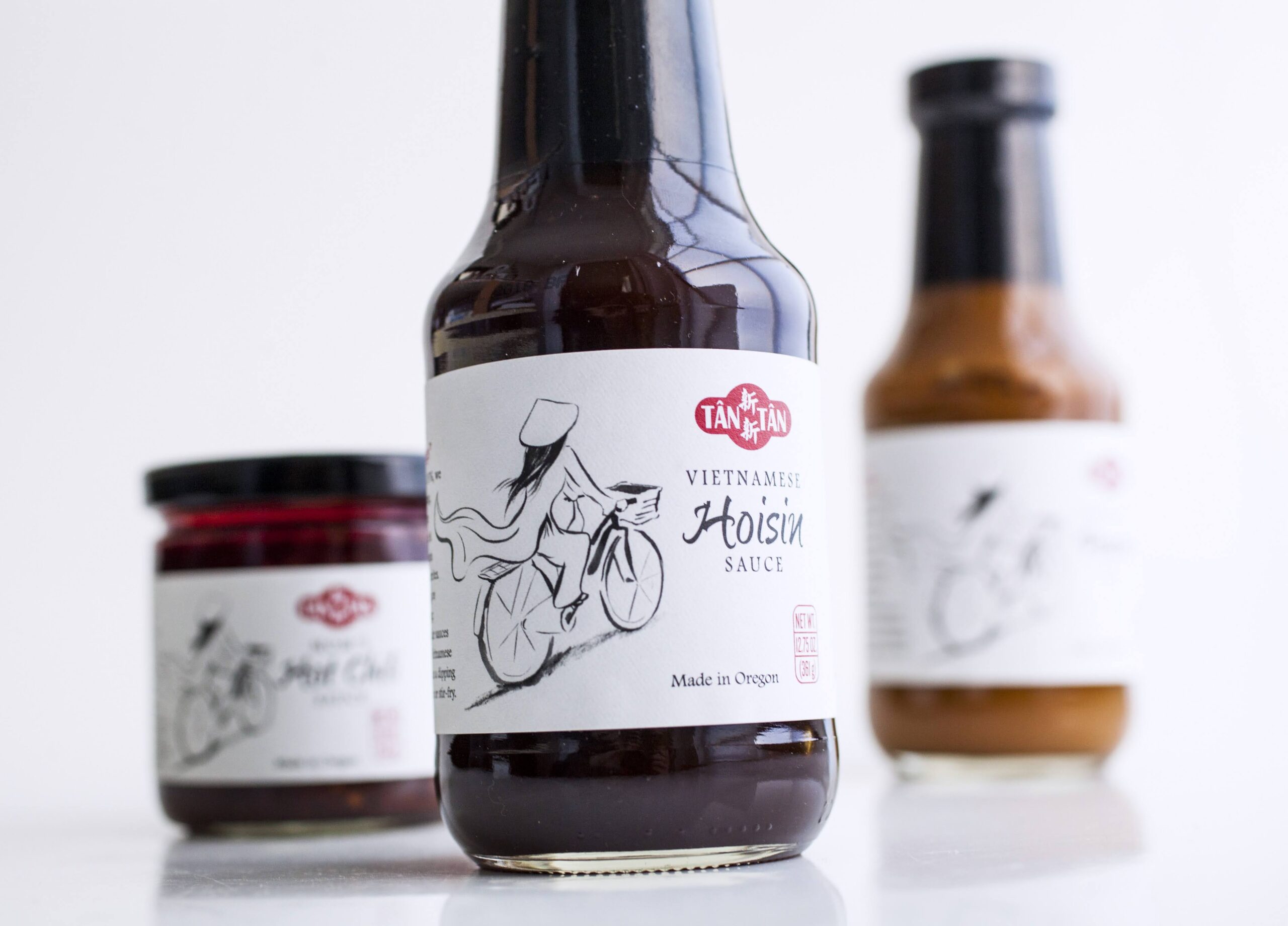By Mahlon Meyer
NORTHWEST ASIAN WEEKLY

Sauces and dishes from the Tan Tan Cafe & Delicatessen in Beaverton, Oregon (Photo by Christine Dong)
The sauces come in four varieties—Peanut, Hoisin, Vegan Fish, and Hot Chili. On their label is a picture of a Vietnamese schoolgirl with long hair riding a bicycle away into the distance. These sauces, which are now available in 2,500 grocery and specialty stores, saved the Tan Tan restaurants from disaster.
“I never thought these family sauces in bottles could end up on the shelves of actual grocery stores,” said Lisa Tran, co-owner with her mother.
How this happened is a testament to the power of the resources provided by the U.S. Small Business Administration (SBA), a federal government agency that provided training and resources to Tran to launch the line of sauces.
The Summit
Now, the SBA is preparing to help launch an economic summit sponsored by the Biden-Harris administration in Seattle on March 30.
The White House Initiative AA and NHPI Economic Summit will provide opportunities to “learn how the Biden-Harris administration is promoting opportunity for Asian American, Native Hawaiian, and Pacific Islander communities.”
Tran is encouraging small business owners and restaurateurs to attend.
“I hope my enthusiasm for the SBA and the work we have done with them shines through,” she said. “Tan Tan really wouldn’t be here without their support!”
From sauces to salvation
Tran’s story epitomizes what the SBA has to offer and how enterprising business owners can take advantage of it.
Still, she emphasizes that when she began training with the SBA, she had twins that were 1-year-olds and she was moving and remodeling a house.

Lisa Tran’s parents, Vinh and Hongmai, in a refugee camp in Galang, Indonesia, after escaping Vietnam in 1976. (Photo courtesy: Lisa Tran)
“If I can do it, anyone can.” Tran and her mother had been running two Vietnamese restaurants, one in Vancouver, Washington, the other in Beaverton, Oregon. Her parents were refugees from Vietnam, and Tran had been born in a refugee camp in Indonesia, coming to Oregon when she was 2 months old.
In 2016, she found a business planning course offered by the SBA because she wanted to create an app for her family’s restaurants. That led to another course, offered by the SBA in conjunction with a local community college, about how to bring a product to market.
It was entitled, “Getting Your Recipe to Market.” The culmination of the course was to pitch your product to a retailer.
“I didn’t even have a finished product, I just took some of my mom’s sauce, the kind she had been making for decades and we had been serving in our restaurant, and I put it in a glass bottle and stuck labels on the side,” she said, still laughing in amazement and delight.

The logo on the sauce is an illustration based on a photo of Lisa’s mother riding off to school for a better education. (Courtesy of Tan Tan Foods)
(The logo she ultimately chose was an illustration from a photo of her mother as a girl—riding off on her bicycle to school for a better education.)
She made a pitch to the headquarters of the New Seasons Market in Portland.
“Normally, it’s very hard to contact retail buyers, because everyone wants to get their product on the shelves,” she said. Mentors helped her arrange the pitch.
It worked.
By late 2017, she was distributing three kinds of sauces from the family restaurants. And the stores that offered them kept growing. Now they include Safeway, QFC, and Town and Country Market.
When the pandemic hit, it was the sauces that saved her.
When restaurants for the most part shut down, they now had a positive revenue stream from their bottles of sauces, now spread across the country. It was beyond her imagination.
“It also helped me realize I could grow beyond the coattails of my mother.” The family also utilized the Paycheck Protection Program (PPP) offered by the SBA to help meet payroll.
“The PPP has gotten some bad press because some people abused it, but that’s really a shame,” she said.
The sauces were now so hot off the shelf, that Tran had to shut down the restaurant in Vancouver.
“I just couldn’t manage all of it,” she said. The sales of the sauces had skyrocketed.
Today, people come to their restaurant sometimes after trying their sauces from the supermarket and being inspired to travel to Oregon. She said a family recently came from Boston, where they had been using their sauces.
Frontline resources
For Mike Fong, formerly the senior deputy mayor for Seattle and now a regional administrator for the SBA, hearing stories like this makes his job worthwhile. The work his agency does is focused on equity, he said.
“From President Biden to Vice President Harris to SBA Administrator [Isabel] Guzman, centering equity is most important.”
The upcoming summit will bring together resources in different sectors, including retail, restaurant, and hospitality, to name a few, to offer tips about successful strategies across the nation.
This will be the third summit in a row. At previous summits, in Philadelphia and Chicago, both private sector leaders and government experts led breakout groups on topics such as access to capital.
But Fong pointed out the sessions are organized with technical, strategic, and marketing expertise offered along with information about accessing grants or loans. SBA also offers free training and assistance in conjunction with technology companies such as Comcast in online marketing.
“We have a digital alliance with tech companies that is made available to small businesses at no cost,” said Fong.
Retail and restaurant associations from across the country will provide insights about dealing with frontline challenges. These include worker retention, online presence, marketing, and managing costs.
At a time when these sectors, particularly, are still struggling to recover from the pandemic, Fong said the lending resources are also driven by principles of equity.
There may be resources that small businesses from marginalized communities may not normally find readily accessible, he said.
Said Tran, “I never would have known all the resources that are out there,” she said. “I strongly recommend people attend.”
Immediate results
Breakout sessions include contracting with the federal government.
As a direct result of the recent Chicago summit, seven businesses have begun contracting work for the General Services Administration (GSA). The GSA provides workplaces by constructing, managing, and preserving government buildings and by leasing and managing commercial real estate.
On a recent visit to Boise, Fong met up with the founder of a company that makes cup holders to keep beverages cold throughout sporting events. But after going through an SBA leadership program, the business owner said she found her voice for the company. Now, using the same technology, the company has applied it to other needs, including the transportation of sensitive materials for the defense department and respirators for hospitals.
The SBA program gave her the seeds to go forward, she told Fong.
A new beginning
For Tran, the creation of a product to sell outside the family restaurant was also symbolic of a larger issue.
“I started distributing these sauces in 2017, when there was all that anti-refugee and anti-immigrant rhetoric.” Telling her family’s story on the back of the bottles was a meaningful way not only for her, but for others to have a new start.
“For Tan Tan Foods, the logo of my mother on her bicycle symbolizes our family’s quest for a new beginning,” said Tran. “For us and for others.”
For her children, it has already begun.

Lisa Tran with her twins—when they see her sauces, they say, “Look, it’s mommy’s sauce!” (Courtesy: Tan Tan Foods)
Her twins, now 8, regularly delight at seeing the Tan Tan sauces in the supermarket.
“Look, it’s mommy’s sauce,” they say.
To learn more about the story of the Tran family, go to: tantancafedeli.com/
To learn more about the White House Initiative AA and NHPI Economic Summit on March 30 or to register for it, go to: eventbrite.com/e/white-house-initiative-aa-and-nhpi-economic-summit-seattle-tickets-569942261647
Mahlon can be reached at info@nwasianweekly.com.


